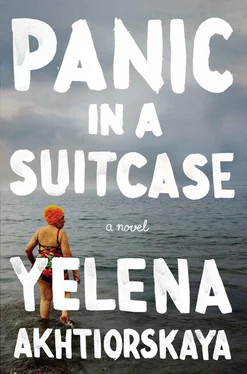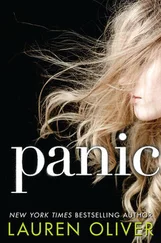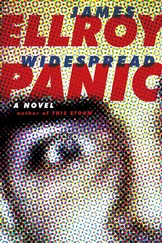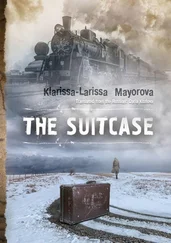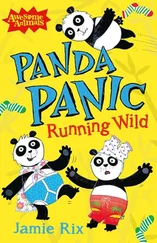Then you’ll probably need an extra blanket. Because — don’t let the daylight fool you — at night it gets quite chilly. The bedding was in an outdoor closet near the outhouse right around back and sort of diagonal. Be a dear, said Nadia.
Gray muffled light was like a sticky net out of which it was impossible to break free. It was sobering, neutralizing light. The gate through which they’d passed already looked like a different gate. How had she even recognized this dacha as her own? Looking around, she recognized nothing and couldn’t even say for sure from which direction she’d come. But she knew where she had to go: the closet. There was patchy shrubbery and twigs, powdery piles of dry leaves, a partially duct-taped hose spitting up bile, some wild berries trying to establish secret niches. Things were either dying off or scheming for diabolical proliferation. This was a real plot of land, instantly invigorating. Getting sheets and a pillow, when it involved stepping over malicious plants, shaking open the rotted door of a death closet, and watching slinky spiders and billowing centipedes scurry creviceward, wasn’t a chore but an ultimate test of will and character, and by succeeding, by making it back to shelter with sheets and a pillow, a victory of no measly significance was secured. No challenge was beyond her. Only she’d forgotten the blanket and towels, and a pillowcase wouldn’t hurt.
By the time Frida made it back with every unfitted scrap of starchy cotton a person could desire, Nadia had drifted off. Breaths were being sucked in and held captive in that ossified chamber for disconcertingly prolonged stretches. In the dank, medicinal room ripe with a scent of old saliva stood Frida, holding everything, unable to move. Should she put the linen down, where, and then what?
She reminded herself that just a moment ago she’d felt great success and certainty. Now her arms ached and she was coughing into the linen. All of a sudden, it came into perspective: She’d gone to be disappointed. This must’ve been her actual reason all along. Disappointment had become necessary in order to forge ahead. Several times in one’s life, a good sobering was required, and that’s what this trip was — a blatant disappointment that would serve as an electric charge to zap the elements back into motion, realigning the facets of her life that had been allowed to slacken into disrepair and stagnation. It was like her mother’s favorite anekdot about the lady who goes to see the rabbi and complains that life is so terrible with her slob of a husband and the crying children in a tiny apartment with such neighbors you start to think it might be better to be homeless, and the rabbi advises the lady to get a goat, so the lady does as told and not a week later is back to see the rabbi in a far worse state, complaining that the goat makes a mess and eats their food and stinks up their place and bleats all night long, to which the rabbi says, My dear Rivkele, as I see it, the solution to your dilemma is only too clear — you must get rid of the goat!
Frida returned the linen to the closet and decided to forgo the not yet urgently needed services of the outhouse (one test of will and character a day being plenty), then tiptoed past a tree stump bearing the strangulated markings from their old mesh hammock, to the gate, where she found her prayers answered — the lock had indeed been broken by Nadia’s metal-bending fingers. It dangled, sad and limp, scary no more. Escape was imminent, which made it infinitely less desirable. A mental photograph was in order (her parents’ camera, memory stick, and charger remained lodged in the sock-cushioned core of the bloated suitcase, through which Volk’s wife was currently digging). Frida turned to take in the dacha one last time, but the scene was already jumbling, blurring, rearranging. Her mental photo would end up atrociously underexposed, a photo foremost of darkness, of a gritty, inexact darkness that could roll over vivid three-dimensional worlds and crush them. Luckily, her parents, who boasted a fine medley of hobbies, would never get to see the result and criticize her retina for being set on the wrong shutter speed or her laziness for not moving a few feet left to catch better natural light.
Frida was out of there and fast. No choice but to trust her feet to deliver her to the spot where the tram had dropped her off. Cicadas transmitted a dangerous electrical current to either side of the narrow path down which she was hurtling in an attempt to outrun, not least of all, their panicky buzz. She turned a corner into what she kept fingers crossed would be the wide, dusty alley tenderly called No Name Alley that opened out to the road with the tram tracks, but ended up deeper in the maze on a still-narrower, craggier path. In the distance a dog’s bark was put out like a fire. Helicopter sounds drew her gaze upward. Overhead weren’t the black, barbell-shaped things that carried presidents over the waters of Brighton Beach but nothingness, the sky a groovy blue-white tie-dye generator, building to something and collapsing, self-consuming, spinning, and dissolving. Orient her it did not. Through a gash in a fence, she saw wet laundry on a clothesline, flapping wildly. Was there a breeze? Gravel crunched under her feet, sending shooting pain because those broad, veiny feet were bare — oh, no, how had she forgotten? Nadia would wake to Frida’s beat-up Keds but no Frida. Such a misstep was hard not to read as a bad omen. Leaving behind something so personal was unwise; Nadia was sure to have a rich knowledge of black magic.
No longer was it gravel, concrete, or cool, looping weeds being driven between Frida’s toes but sand, and the green shards from smashed bottles that went with it. She had bumped into the Black Sea. It was nice. Either today was Saturday or the stories were true and every day was Saturday by the sea. The crowds were thick and boisterous, shuttlecocks shared the airways with dragonflies and bright yellow wasps, beer cans sweated into swarthy clutches, prepubescent boys with punched-in chests ran around recruiting people for a ride in their hydrobikes. This is the life was written in smug ink on every aired face. A girl in a cobalt bikini held a glistening ear of corn-on-the-cob while an old woman with a cart hobbled away a few hryvnia wealthier. The girl’s pinkie jutted, an antenna straining to transmit a weak signal of femininity. Gripping both ends, she leaned forward so that the lost kernels would land in the triangle of sand between her splayed legs and began a very methodical process of rotating the cob while clamping and unhinging her jaw.
Frida’s feet hurt. She stuck them into the frazzled end of a milky wave and tried to feel something, quickly realizing she should’ve made use of the outhouse. What was largely speculative twenty minutes ago was now an emergency. She could go into one of the indistinguishable cafés lining the beach, but her pants were off and she was running. The water was up to her neck, and relief was not to be measured in milliliters.
Some kind of childish force overtook her, dragging her to the bottom of the sea, turning her upside down into handstands and underwater somersaults, as if she were stuck in a washer-dryer, tumbling forward. The machine had been fed only so many quarters, and at some point the propelling force abated. Frida continued splashing around for a few minutes before the atmospheric change was noted — it had grown darker and more silent. She had just popped up from yet another exploration of the oddly fishless depths and thought the seawater had plugged her ears. She stuck in a pruned fingertip and shook. Nothing dribbled out. It was an eventful quiet, like the hushed voices and mincing footsteps that had nightly navigated the corridor outside her childhood bedroom door. And the darkness — could it be dusk already? Could it be rolling on so unevenly and suddenly, in such odd clumps? Frida was facing the horizon, and instinct turned her head to the right in search of the pier and the setting sun, but there was only a thicker pile of altered atmosphere, dense murk. This wasn’t Brighton, however. When in a certain mood, Marina liked to proclaim that Odessa was inferior to Brooklyn only in that it had a north-south as opposed to an east-west beach, meaning that if you intended to tan properly — and why wouldn’t you? — by day’s end you’d be facing not the glorious sea but the trash cans, café drunkards, smog off the city’s skyline. Aha! But having turned around, Frida still failed to locate the sun, instead finding that the beach, just a moment ago populated by the malnourished and seedy, the youthful and sluggish, the elderly and exhaustingly vital, was almost entirely cleared. Food wrappers and trampled sand. A chaise longue tipped on its side. The remaining few were bent over, stuffing haphazard handfuls into giant straw bags before scampering off. The backs of their knees were heartbreaking. Frida thought she saw a bowlegged man squat down and in a single jerk snatch her stuff, which she’d left in a deflated heap begging to be snatched. Wait, she yelled, young man, wait! But why should the man, who wasn’t at all young, do that? The bowlegs were perfect for getting over a jetty. Her muscles turned leaden. The sky, too, seemed to have turned to lead. This low, oppressive ceiling was bound to collapse. Almost with relief she realized how dire the situation was, how inexorably dire. There was no one around. Odd objects were being hurled by gusts, rebounding off metal clouds. Birds — tiny seagulls — were flying low and fast. All was lost. She heard a rumble, felt a drop.
Читать дальше
